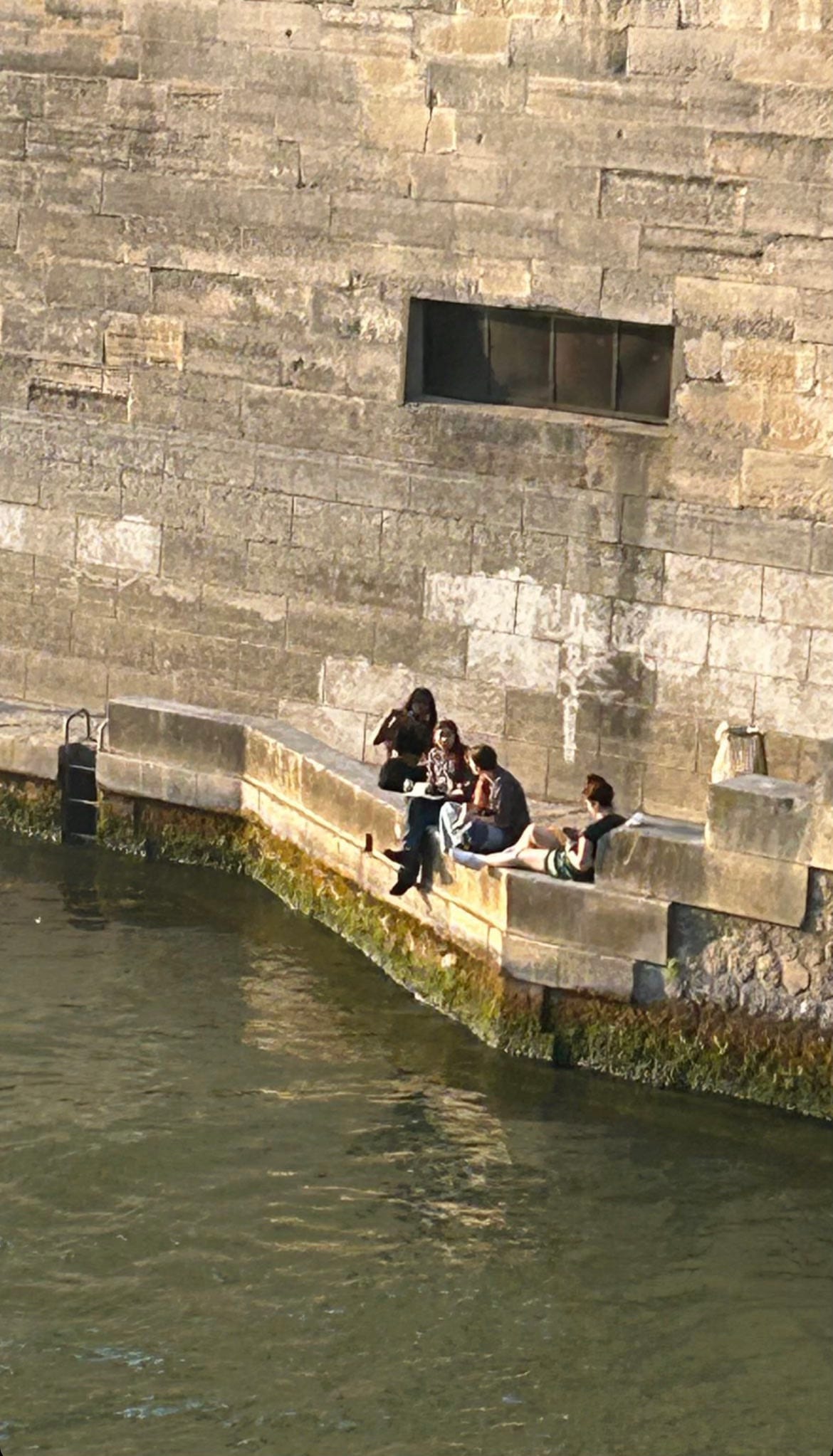July 7th, 2023 — Paris, France
Plums are dark. Dark, sensuous, juicy, and sweet. Purple-y orange tinges break on my tongue, reminding me of the soft lighting on the underground level of Cafe Oz. Nothing is quite black, not quite purple, but something in between. I can see her face reflecting off the lights, there one second, gone the next. A glass of wine in her hand, sometimes a Bordeaux that’s similar purple to the plum. It swooshes dangerously close to the edge of her glass as she makes her way through the crowd, almost daring to drop onto her white cream dress. It does, but it is hardly noticeable because of her charismatic beauty.
I worry about my Plum. I worry she is tumbling down a staircase far too fast and bruising that orange flesh until it is unsalvageable. Nothing left to do, but tos it to the deer for them to pick at when the grass runs out. I love my Plum, and I love her adventures, but I am worried. She has gone too dark, too seductive. She’s so sweet, it would be easy for a fang-toothed creature to swoop in the night, snatching my plum out of the shadows and piercing the skin until all that’s left is a dry, barren seed of the fruit.
Her Bordeaux is almost empty, and I remind her that I owe her a drink. Does that make me an enabler? Am I the fang-toothed demon sweeping in and replacing her plum-stained glass, watching the smile on her plum-stained lips? My Plum will soon be alone without my hand, and I worry.
I bought a wine-purple journal when I was in Paris because all of my new friends journaled and I wanted to journal too. It made me feel more introspective than I was, and more emotionally unstable than I was. When facing a blank page, I find that I either come to reckoning with my strongest dreams, or my absolute worst fears. There’s unfortunately no in-between for those.
This weekend, my boss pulled me aside and asked me if I felt okay with my workload. She said that I was taking on more than I signed up for, and that it was okay to leave things for other people to do. I find this is a theme that is recurring in my life.
“On Plums” — what I’m deciding the piece above is called — was a free write during my creative non-fiction class that was supposed to be about plums. Naturally, I had to make it a metaphor and complicated and serious (as most writers do.) During this time, I was worried about a friend. She was going through a rough patch, and even though I’d known her for maybe three weeks at this point, I felt deeply connected to her. I worried.
When I reread the things I scribbled in my journal in Paris, I look upon them fondly. My friends and I did silly things and serious things and managed to squeeze a semester’s worth of learning into four weeks whilst also capitalizing on the city scene.
If I had to calculate the amount of time I spent worrying about other people, I’d say it’s nearly a quarter of my life. I’ve been a worrier since before I could remember. One of my first memories is freaking out during my second-grade fire lesson, because 'STOP DROP AND ROLL’ didn’t seem like an effective way for my family to escape a fire. I made them plan a fire escape plan when I got home that night and then cried on the floor of my spare bedroom.
There’s not really a way for me to stop worrying about other people, and I figure that if I haven't figured out a way to stop after 19 years I won’t find something in the next 19 years. I told my new therapist (after my last one ghosted me after FIVE YEARS….) last week that my anxiety was normal. She questioned what that meant to me. I told her that it’s just kind of a part of me that I’ve accepted at this point. Almost like an annoying sidekick. She’s just there. I realize this probably isn’t great for a therapist to hear.
Eve Babitz, one of my other favorite writers, wrote that “it was all balance. But then, she already knew that from suffering.” Sometimes I wonder that I perhaps destined myself to despairity when I decided I wanted to become a writer. Writers aren’t known for being happy – take “A Little Life” by Hanya Yanagihara, an extremely popular book that’s also extremely depressing. (I could write an essay on how no one should read this book. It relies on shock factor and explicit violence to garner fans. I read it when I was 15 and it nearly drew me back into a depressive episode. But I digress). People read to feel heard, and often times you need relatability when you are struggling. There’s nothing wrong with this practice — I engage in it oftentimes myself — but it also means that books about wonderful lives aren’t often praised.
I grew up, and I read more, and I realized that the writing I craved to create meant I needed a traumatic life. Was I destined to be sad because I chose to be a writer, or was I destined to be a writer because I was sad?





